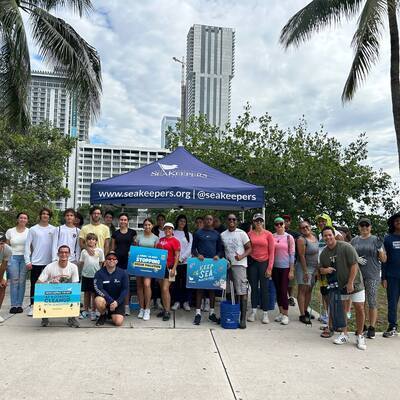Monthly Margaret Pace Park Cleanup
Miami, Florida
August 10, 2025
Overview
On Sunday, August 10, 2025, The International SeaKeepers Society returned to Margaret Pace Park for a coastal cleanup. This park is located in a busy neighborhood in Downtown Miami and sits right on the coast of Biscayne Bay, making it a hotspot for marine debris. We were joined by 27 volunteers who gathered for an instructional briefing before grabbing the provided mesh bags, buckets, gloves, and pickers to remove any trash found in the grass, on the rocky shoreline, or the surrounding streets. After receiving a lot of rain the days leading up to the cleanup, a lot of trash was littering the shoreline of the park, either floating in the shallow water or caught in the rocks and mangrove roots. Our volunteers returned with endless full bags and buckets of trash, consisting mostly of hard and soft plastics. Some volunteers used Marine Debris Tracker to contribute to citizen scientist data, with one volunteer logging over 325 cigarette butts collected in just two hours! Thanks to the hard work of our volunteers, we removed more than 155 pounds of trash from the park and surrounding water, leaving it cleaner for marine life to enjoy.
Marine Debris Tracker is a data collection app that allows the general public to contribute to an open-date platform and scientific research by recording the different types of litter, specifically plastic pollution, that they find in either inland or marine environments. Marine Debris Tracker was developed by the University of Georgia’s Jambeck Research Group, which SeaKeepers worked with in 2021 when the Jambeck Research Group collaborated with Ocean Conservancy to assess Miami’s plastic waste management, known as a Circularity Assessment Protocol. SeaKeepers again assisted the Jambeck Research Group’s Circularity Informatics Lab in 2022 with another Circularity Assessment Protocol in the Florida Keys. The researchers of the Jambeck Lab use the Marine Debris Tracker app to record their data, and with citizen scientists also using the app, more data can be collected in different areas. Using Marine Debris Tracker at our cleanups involves community members in creating a bigger picture of plastic pollution, and provides the means for new scientific findings to be generated as well as for effective local legislation to be informed. SeaKeepers is excited to be incorporating this app at our cleanups and continue our mission of coastal education, protection, and restoration. In this cleanup, 15% of volunteers participated in using the app to record data.


You must be logged in to post a comment.